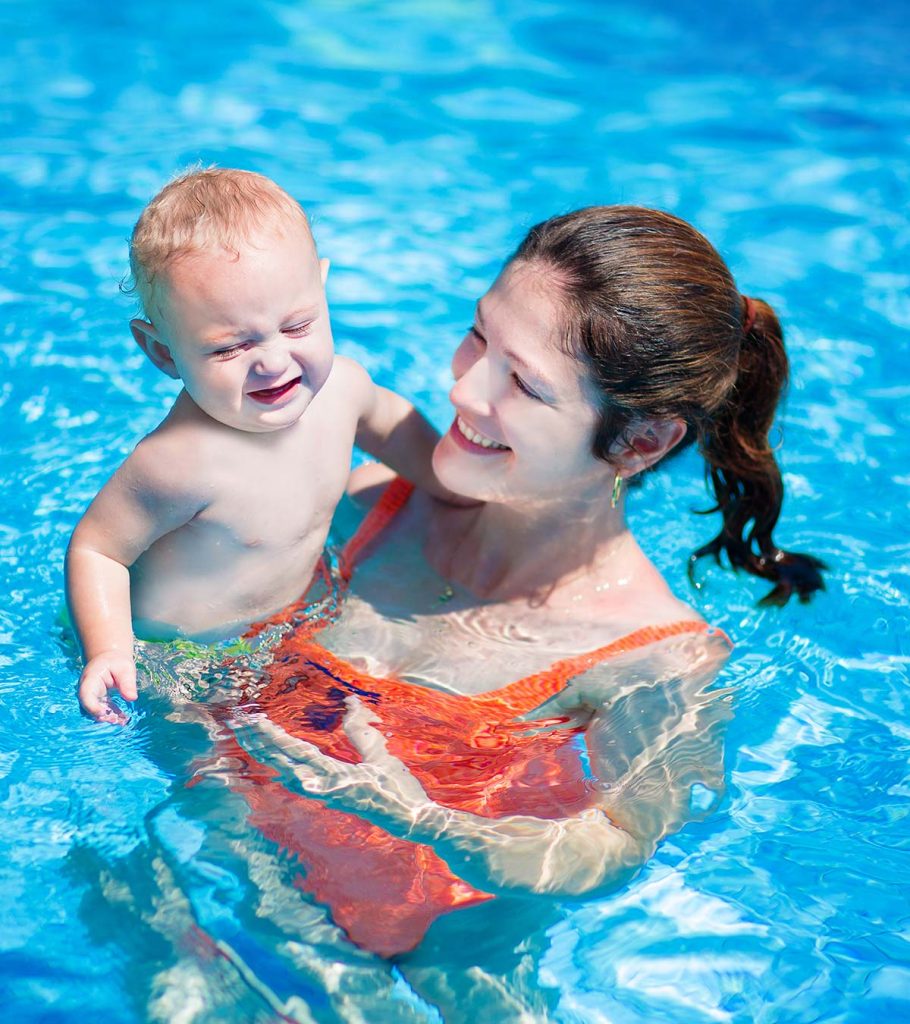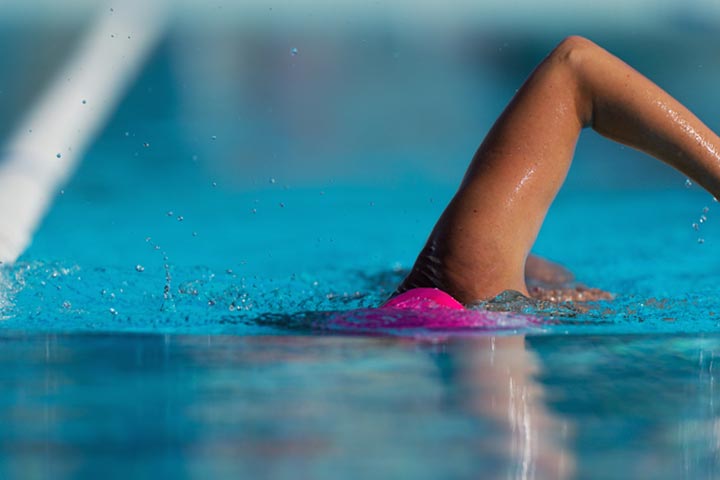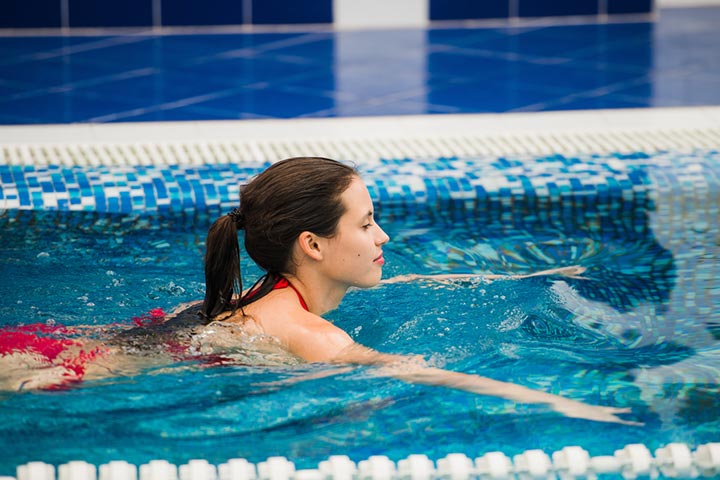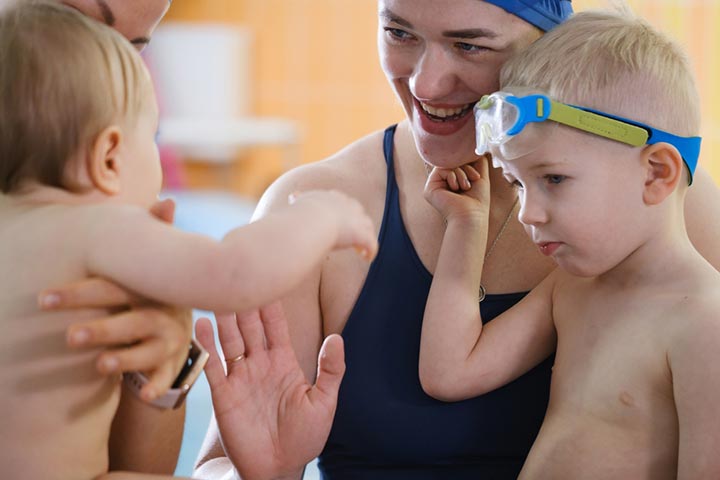If you are a new mom who has just begun the journey of motherhood with breastfeeding, you may have questions about resuming activities like swimming when breastfeeding. Although swimming is an excellent post-natal exercise, most new moms wonder if it is safe to swim while nursing as now you have a little on to take care of. However, one golden rule to follow when breastfeeding is-if it is suitable for your baby, it is safe for you too. Moreover, swimming helps you keep your body healthy and fit while helping you lose the extra kilos. If you wish to know more about the safety and risks of swimming and breastfeeding, read on as we discuss some noteworthy points that may help you make an informed decision.
Is It Safe To Swim While Breastfeeding?
The rule of thumb you need to follow while breastfeeding is if anything that you do does not hamper infant care and is okay for your newborns, then it is okay for you too. There are a few concerns you may have regarding swimming while breastfeeding. Let us take a quick look at (1) (2).
1. Swimming Can Make Me Thin And Make Me Produce Less Milk:
Swimming is a type of physical activity that helps you lose the extra kilos you gained during pregnancy. Your doctor will give you the green signal for swimming as long as you are not feeling weak and are in the recommended weight bracket. Do ensure you regularly get your weight checked. Losing too much weight too quickly in the postpartum period can impact lactation and milk production. Breastfeeding women should not lose more than 1 lb per week to maintain a full supply.
2. Swimming In Chlorinated Water Can Dry Out My Nipples:
Being in chlorinated water can be dehydrating for your skin including your nipples. Always take a shower once you have finished swimming to protect yourself and your baby. If you feel there is additional dryness, invest in a safe and effective nipple care cream. Apply this after you have fed your baby so that your baby does not end up swallowing it while feeding. You may even even allow a few drops of breastmilk to air dry on the nipples and areolas to fight off dryness occurring from chlorine.
3. The Cold Water Can Affect My Breast Milk Production:
Sometimes being in very cold water can make your body go into shock or stress mode. It can lead to a reduction in the levels of oxytocin in your body. Oxytocin is a natural chemical that helps breast milk flow. Swimming does not reduce the levels of breast milk, but stress can. Usually after stepping out of the pool when you are properly dry and dressed your body heat levels will come back to normal. Therefore, it should not affect your breast milk levels. If you still feel that cold water activities are causing stress to your body, you may try swimming in heat-regulated pools.
4. Swimming Too Much Can Change The Taste Of My Breast Milk:
Swimming does not change the taste of your breast milk. However, exhaustion after exercising may increase the lactic acid buildup and change the taste of your breast milk. Swimming without exerting yourself too much is a safe way to rule out lactic acid buildup.
Points To Remember For Swimming While Breastfeeding:
Once you decide to go ahead with swimming, here are a few things you should keep in mind when you have decided to practice swimming when breastfeeding:
- Always breastfeed your baby before you swim
- Regularly check your nipples each day to look for excessive dryness or cracks
- Use a good nipple care cream
- Always wear a bra or a breastfeeding-friendly bathing suit that will offer good support while swimming
- Always shower after swimming
- Stay hydrated
- In the case of any dizziness or discomfort come out of the pool immediately
- Make sure the pool is clean
- Do not swim if you are not well
Benefits Of Swimming:
Swimming will help you stay fit in the following ways (3):
- Build endurance levels, muscle strength
- Help in cardiovascular fitness
- Prevent obesity
Swimming is a great postpartum exercise for maternal health fitness and prevents postnatal depression. It is also a great way to introduce your baby to the pool once it is ready, provided that all water safety rules are followed properly.
Swimming while breastfeeding is safe, and it is the best way for moms to lose some extra pounds. You may try swimming after six weeks postpartum when the vaginal discharges cease and your uterus is healed after childbirth. Before swimming, you may breastfeed the baby and always use a good support bra and nipple care creams to avoid discomfort and dryness. Choose a clean pool to swim and shower after swimming to protect your skin from chlorinated water. Swimming can also improve endurance and promote cardiovascular health. It can also be a preferred exercise if you have knee pain while standing or walking due to weight gain.
Key Pointers
- Swimming is a safe and effective exercise for post-natal fitness.
- Swimming can aid in postpartum weight loss, but it’s crucial to slow down when feeling weak.
- After swimming, women should shower and use topical creams to prevent excessive skin or nipple dryness.
- Breastfeeding mothers should invest in a high-quality bathing suit and consider feeding their baby before swimming.
- Additionally, it is recommended to stay hydrated, select a clean pool, and avoid swimming if feeling unwell.













